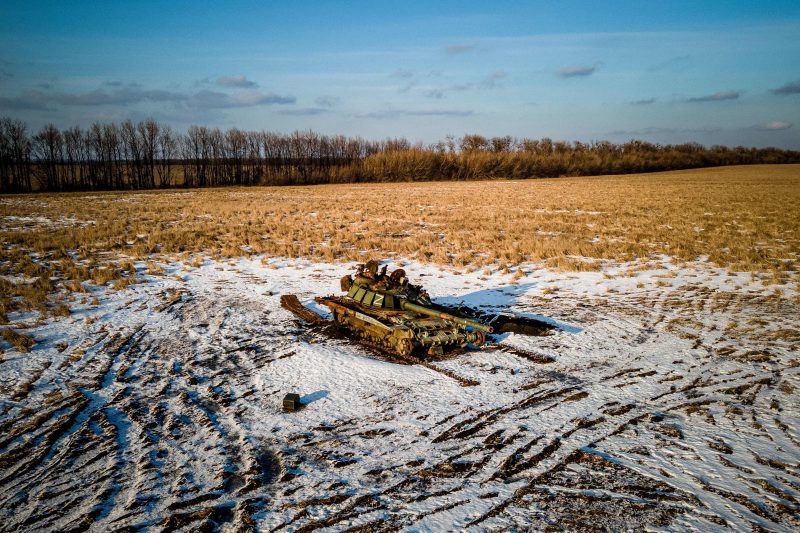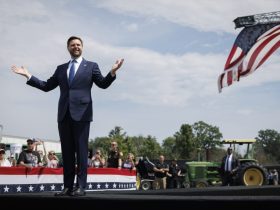The world I grew up in was one in which there existed a tangible possibility of annihilation. I can’t identify when I learned about nuclear weapons and the threat of the Soviet Union; I don’t remember not knowing about it. This wasn’t the Cuban missile crisis era of the Cold War, but it was still the Cold War, when President Ronald Reagan was recommending that we place anti-nuclear defenses in space and the comic strip “Bloom County” was making fun of him for it.
When I was in high school, the threat posed by the U.S.S.R. vanished along with the U.S.S.R. itself. The wall came down and all of that; the global order lost its foundation and resettled in a new pattern. Russia was no longer the country’s primary enemy, to the point that President Barack Obama scoffed at the idea during a 2012 presidential debate.
This was fitting, given Obama’s role as champion of young America. In 2021, more than a third of the country had been born after 1991. Nearly half of the country hadn’t been born or was under the age of 5 when the U.S.S.R. broke apart in 1991. They grew up in a world where the Cold War was history, not a day-to-day reality.
Soon after Russia decided to demonstrate its global strength one year ago by invading Ukraine, I noticed a pattern in polling on the conflict. Older Americans were much more concerned about the outcome of the conflict than younger Americans, for example, according to polling conducted by YouGov soon after the war started. The dividing line? Around age 45, or people who were young teenagers when the Soviet Union collapsed.
This overlapped with a greater antipathy about the combatants among younger Americans. Those under the age of 45 were more sympathetic with Ukraine than with Russia, but less starkly than older Americans. They were also more likely to say that they sympathized with neither the invaders nor those being invaded.
Granted, this was early in the conflict, before the scale of the Russian atrocities in the conflict, like the massacre in Bucha, were well known. Some of these responses were probably rooted in disparities about familiarity with the conflict, though that, too, may have been colored by greater interest among those who remember living through the Cold War. In the same poll, though, YouGov found that younger Americans were also less likely to view NATO favorably than older Americans, itself a probable reflection to some extent of understanding NATO’s 20th-century role.
With the anniversary of the invasion falling on Friday, I reached out to YouGov for updated data on the age gap in views of the conflict. I centered on one pair of questions: whether Americans viewed Russia or Ukraine as friendly or allied nations.
In individual polls taken since the beginning of 2022, we see a consistent pattern. Older Americans (those 45 and up) are more likely to view Ukraine as a friend or ally and less likely to say that of Russia. Views of Ukraine spiked after the invasion occurred last February.
But in recent months, after YouGov began asking the friend/ally question about Ukraine again last fall, the gap between old and young on Ukraine has narrowed.
Why? It’s not because of a change among Democrats. The same age gap exists with Democrats as exists overall, but views of Ukraine as an ally or friend have been stable among both the older and younger age groups.
Instead, we see that it’s a change among Republicans. Soon after the invasion, views of Ukraine as a friend or ally surged among Republicans of all ages, as they did among Democrats. Since last fall, though, that view has eroded, particularly among older Republicans.
Views of Ukraine among older Republicans now are not much different than they were before the invasion.
It’s hard not to think that the shift in right-wing media has influenced this change. Fox News’s Tucker Carlson has become a favorite on Russian state television for his frequent advocacy of pro-Russia or anti-Ukraine rhetoric. (In 2019, Carlson infamously said he was “rooting” for Russia to prevail in its geopolitical conflict with Ukraine.) Prominent voices on the right such as Rep. Marjorie Taylor Greene (R-Ga.) moved from casting the conflict as unwinnable to too expensive, a shift in tactics if not position. Greene was on Carlson’s show Thursday night on the eve of the anniversary of the invasion, calling the conflict a “war against Russia in Ukraine.”
Older Republicans are still more likely to view Russia as hostile than are younger Republicans, but they are less likely to view Ukraine empathetically. If the Cold War informed initial American reactions to the conflict, the Partisan War that drives so much of our current politics and conservative media appears to have reshaped them.








